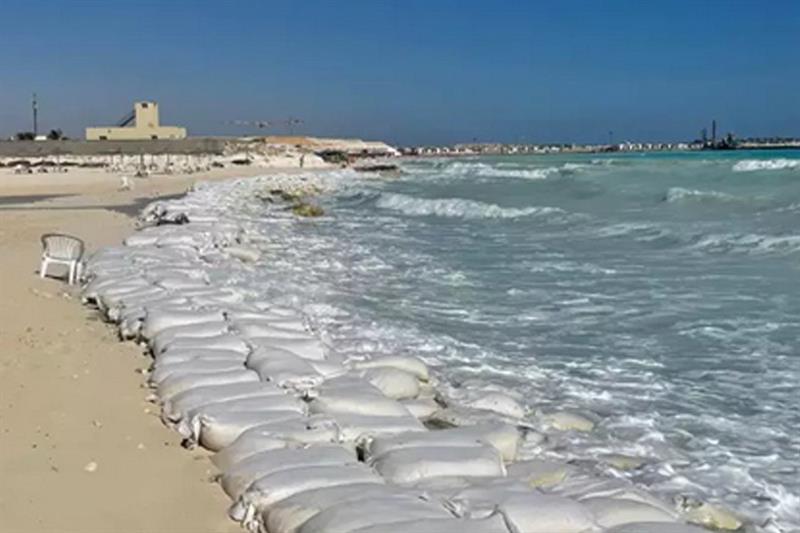
The shore line is receeding in a number of North Coast resorts
Complaints about the turbidity of the seawater and beach erosion in the North Coast area of Sidi Abdel-Rahman found their way into the media over the last two weeks, prompting action by the Ministry of Environment in coordination with the Ministry of Irrigation and other bodies.
The turbidity of the water was reported in the area neighbouring the Marassi resort owned by the Emirati multinational Emaar and was the result of dredging near that part of the beach.
The Ministry of Environment ordered a committee to be formed to conduct tests in the area. This concluded that the water turbidity was due to dredging. The ministry is currently drafting a report including solutions to the problem that will be submitted to the Licensing Committee at the Ministry of Irrigation, the body responsible for granting permits for construction or other work near beaches, said Yasmine Fouad, the minister of environment.
Orders were given for the dredging work to halt and for equipment to leave the beach site, resulting in the gradual decrease of the water turbidity, the committee conducting tests reported. It said the environment was safe in the area and that touristic activities were unaffected.
The ministry said it was following up with the concerned bodies on a daily basis and conducting inspections of all the resorts on the North Coast in order to ensure environmental standards.
The problem was first raised by Salah Hafez, an expert on energy and the environment, who wrote on Facebook that the high turbidity was first noticed a few years ago at the Marassi resort when villas were being constructed on the lower coastal mudflats and in the Ras area that feeds the gulf with sand.
Over the years, the sand decreased at Ras Gebis, a peninsula formed over hundreds of years where soft sand from the sea has accumulated.
Hafez, who was the first head of the Egyptian Environmental Affairs Agency (EEAA), said he had been shocked by the beach erosion at Sidi Abdel-Rahman. The turbidity of the water was also worse than in the summer of last year, he said.
Extending out into the sea to a length of more than 500 metres was a promenade on which buildings had been erected, and the erosion of the neighbouring beaches had been severe, Hafez added.
The Ministry of Irrigation and the Beach Protection Authority had earlier issued a decision banning construction within the shore line of the Mediterranean. The EEAA had also decided to turn down requests to build marinas that were not naturally formed.
Hafez advised the immediate removal of all marina facilities to create sufficient openings to allow the passage of sand under them and refilling beaches with sand by pumping. Groynes could also be built to prevent further erosion.
“I am very disappointed. Egypt will be hosting the COP27 meeting in November to discuss climate change, including beach erosion, and to exhibit our successful experiences in decreasing carbon emissions, producing green hydrogen, and developing the largest energy centre in the region,” Hafez wrote.
“But people will find that one of the most enchanting beaches on the Mediterranean is being eroded.”
The construction company concerned should have abided by the law that states that environmental conditions should be monitored during building in order to mitigate any negative effects on the environment, he said.
Pressure has been mounting to reverse the situation, and the company has said it will finance a temporary solution.
*A version of this article appears in print in the 28 July, 2022 edition of Al-Ahram Weekly.
Short link: